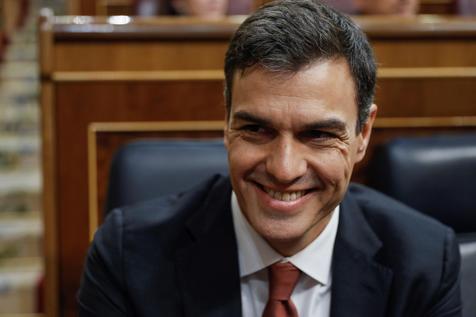POLITICAL deadlock has led Spain’s embattled Prime Minister Pedro Sanchez to go all-out with a snap election-scheduled for April 28.
Politicians of all stripes are now out trying to woo voters across the country amid a backdrop of persistently high unemployment and out-of-control national debt.
It comes as immigration fears and the Catalan crisis have deeply polarised Spanish society and birthed a resurgence of the far-right.

Pre-election polls suggest Spain’s most important election in decades is on a knife edge with no main party likely to emerge able to govern on their own.
To better help our readers understand the electoral landscape, the Olive Press has provided a breakdown of each the main parties running, the key issues on which they stand and, importantly, how expats can get their piece of the political action:
PSOE

Ideology: Social Democracy
European Affiliation: S&D
Predicted to get: 29%
The Spanish Socialist Workers’ Party is Spain’s oldest political group. It traces its roots back to 1879, and forms the country’s current government.
Once proudly socialist and overtly Marxist, the PSOE now clings to more of a centre left democratic socialist position.
PSOE leader Pedro Sanchez became Spain’s Prime Minister by way of a ‘no confidence’ vote against the Partido Popular government of Mariano Rajoy in June 2018.
Sanchez was forced to call the snap election for April 28 after smaller parties that propped up his minority PSOE government withdrew their support and voted down his budget.
The PSOE proposes a socialist platform which looks to strengthen regional parliaments and nationalise water and energy ‘as services of public interest.’
They also seek new taxes on financial transactions and digital services, alongside an increased rate for high earners.
Unidos Podemos

Ideology: Left-wing Populism
European Affiliation: GUE/NGL
Predicted to get: 12%
A patchwork coalition of left-wing parties, Unidos Podemos or United We Can originally formed to contest the 2016 Spanish elections on an anti-austerity platform. The largest party within the coalition is Podemos, a populist anti-capitalist party that grew out of the 2010-11 indignados protest movement under the leadership of Pablo Iglesias.
Podemos’ junior partner is Izquierda Unida, ‘United Left’ which is itself a amalgamation of the Spanish Communist Party and the smaller Republican Left party. The other party to stand candidates under the Unidos Podemos banner is EQUO, a environmental group founded in 2010 by former Greenpeace Spain director Juan Lopez de Uralde.
The coalition is seeking support for a progressive vision for Spain with 100% renewable energy by 2040 and expanded rights for LGBTI groups.
Ciudadanos

Ideology: Liberalism
European Affiliation: ALDE + En Marche
Predicted to get: 16%
Offering voters a blend of social democrat and liberal policies, ‘Citizens’ is a secular centrist party which emerged out of Barcelona in 2006. ‘Citizens’ was founded by middle class Catalan intellectuals – university professors, writers, lawyers – who are opposed to independence from Spain. The party went on to shed its Catalan identity and expanded rapidly, setting up branches nationwide. In the European Parliament, Ciudadanos is a member of the Alliance of Liberals and Democrats for Europe alongside Britain’s Liberal Democrats.
Under Albert Rivera, Ciudadanos defines itself as ‘the party of the centre, progressive, and liberal’ but rivals like PSOE and Podemos are quick to label it right-wing.
The party has already said it would not be willing to form a coalition with the PSOE if Sanchez is in charge.
Citizens go into the election with commitments to tackle corruption and support the middle class. Standout policies include decriminalising euthanasia and subsiding pet adoptions.
Partido Popular

Ideology: Christian Democracy
European Affiliation: EPP
Predicted to get: 20%
Founded by Manuel Fraga, a prominent cabinet member under Spain’s longtime dictator Francisco Franco, the rightist PP is now the country’s largest conservative political party. A member of the European People’s Party, the federation of conservative parties from across Europe, PP holds 16 of Spain’s 54 seats in the European Parliament.
The party won a landslide victory in the 2011 elections under Mariano Rajoy who was eventually brought down by the massive Gurtel corruption scandal in 2018. Current President Pablo Casado has steered to the right in an attempt to manoeuver the party back to power.
The PP manifesto includes plans to to lower the highest tax rate from 45% to 40% and reduce workers’ rights to make firing cheaper.
The PP election platform also proposes mandatory life sentence for murderers and repeat rapists.
Vox

Ideology: Right-wing populism
European Affiliation: NA
Predicted to get: 11%
The youngest kids on the political block and by far the most controversial, Vox – which means voice – is a right wing party launched by disillusioned PP members in 2014.
Controversial Vox leader Santiago Abascal has called feminists ‘bitches’ and expressed a desire to reverse gay rights.
Abascal has also called for a new ‘reconquista’ – a reference to the violent expulsion of Jews and Muslims from 15th century Spain.
The party ran a successful hardline anti-immigration platform in the 2018 Andalucian elections and emerged with 12 seats, tipping the balance of power in the region to the right.
On a national level, Vox wants to recentralise Spain and eliminate the current system of devolved powers to the regions.
The far-right party also supports the deportation of illegal immigrants and the construction of an ‘insurmountable wall’ in the Spanish enclaves of Ceuta and Melilla.
PACMA

Ideology: Animal rights
European Affiliation: NA
Predicted to get: 1%
Championing the rights of animals in a country with a rich culture of blood sports, the Partido Animalista has spent 13 years campaigning against animal cruelty.
The party has been leading the fight to abolish bullfighting in Spain as well as the use of wild animals in circus acts. PACMA activists have organised protests against the practice of mutilating and abandoning hunting dogs, which occurs at the end of Spain’s hunting season each February. But the party has struggled to secure parliamentary seats, despite solid grassroots support nationwide. This is partly due to Spain’s electoral system which disproportionately rewards incumbent parties.
PACMA’s policies look to strengthen the welfare and protection of animals with a call to ban hunting and sport fishing.
The party also want to see a ban on animals in circuses broadened to include zoos and aquariums.
Voting eligibility
Despite being barred from voting in Spain’s general elections, expats seeking their political fix are welcome to vote, and stand, in the local and European elections.
The path to the ballot box begins with registration in the local census, the padron municipal, which enables EU citizens to join the electoral register.
A visit to the ayuntamiento, armed with proof of ID and address and a completed registration form, will secure you some well-earnt democratic rights.
The entire process is free of charge and can be completed before residency papers are received.
An electoral census form should promptly arrive at your door. If one fails to materialise, it can be obtained from the town hall in person or online.
Once securely on the padron, expats are recommended to return to the town hall once more to declare their desire to vote.
Being on the register does grant voting rights but a separate declaration is required.
This can be as simple has walking up, taking your position in front of an official and confidently declaring: ‘yo quiero estar censado,’ literally ‘I would like to be in the census.’
On election day you will find a list of the parties running in the polling booth.
Select the lists of candidates that has won your sùpport and place your chosen ones in the envelope provided.
On vacating the booth, go to the attendant to show your identification and hand over the envelope, then go home and wait for the results.
Did you know?
Spain is a parliamentary democracy with a ruling monarch who acts as head of state and a prime minister as head of government.
Women first won the right to vote in Spain in 1933, only to have it taken away by Franco. Universal suffrage was eventually restored in 1977.
In Spain the parliament is known as the Cortes Generales which consists of two chambers: the Upper House, which is the Senate of Spain and the Lower House, called the Congress of Deputies.
Under Spain’s proportional ‘closed’ list voting system, instead of putting a cross next a name, voters choose between lists of candidates put forward by their parties.
Blind people are able to vote without assistance in elections thanks to a system of Braille guides that Spain claims is a world first.
The size of the Spanish electorate is almost 35 million voters, 1.2 million of whom live abroad.
Click here to read more Spain News from The Olive Press.








